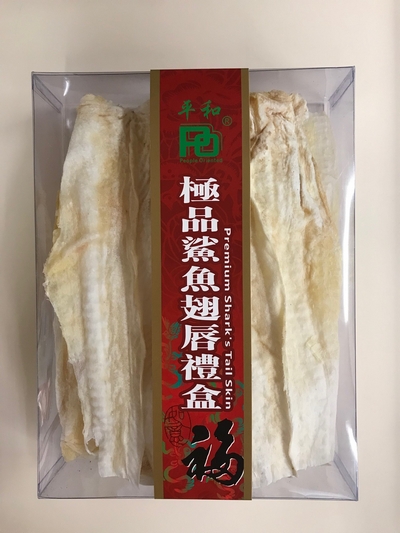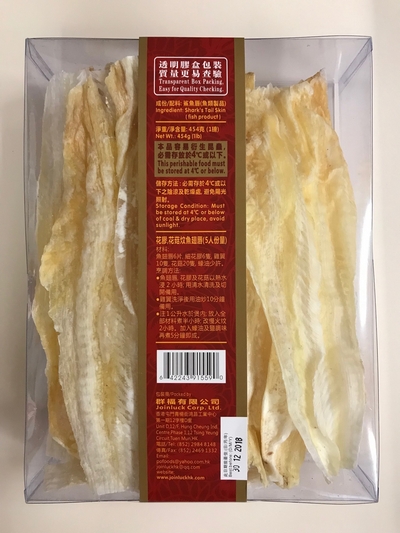Stop consuming shark's tail skin found to contain excessive mercury
| Issue Date |
13.11.2017 |
| Source of Information |
Centre for Food Safety |
| Food Product |
Shark's Tail Skin |
| Product Name and Description |
Product name: Premium Shark's Tail Skin
Brand: People Oriented
Net weight: 454 grams/1lb per box
Packer: Joinluck Corp. Ltd.
Best before date: December 30, 2018
 
|
| Reason For Issuing Alert |
- The CFS collected the above-mentioned sample of shark's tail skin from a supermarket in Causeway Bay for testing under its routine Food Surveillance Programme. The test result showed that it contained mercury at a level of 4.16 parts per million (ppm), exceeding the legal limit of 0.5 ppm.
- Mercury may affect the nervous system, particularly the developing brain. At high levels, mercury can affect foetal brain development, and affect vision, hearing, muscle co-ordination and memory in adults.
|
| Action Taken by the Centre for Food Safety |
- The CFS has alerted the trade and will continue to follow up on the case and take appropriate action.
|
| Advice to the Trade |
- Stop selling the affected product should they possess it.
|
| Advice to Consumers |
- Not to consume affected batch of the product.
- People are advised to maintain a balanced and varied diet. To avoid health risks posed by excessive intake of metallic contaminants, pregnant women, women planning pregnancy and young children should avoid eating large or predatory fish.
- As some international organisations such as the World Health Organization have pointed out, consuming predatory fish species is the main source of mercury intake for human beings. The report of the CFS' Total Diet Study has also pointed out that large fish or predatory fish species may contain high mercury levels (for example, tuna, alfonsino, shark, swordfish, marlin, orange roughy and king mackerel). Hence, groups particularly susceptible to the adverse effects of mercury, such as pregnant women, women planning pregnancy and young children, should opt for fish that are smaller in size for consumption and avoid consumption of the above-mentioned types of fish which may contain high mercury levels to minimise the health risk posed to the foetus, infants and young children by excessive exposure to metal contaminants in food.
|
| Further Information |
The CFS press release |
Centre for Food Safety
Food and Environmental Hygiene Department
2017-11-13

